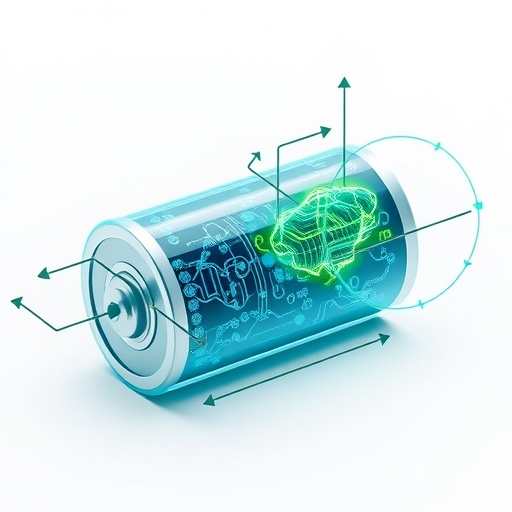In a groundbreaking advancement in battery technology, researchers have unveiled a novel approach to monitor the state of health (SoH) of lithium-ion batteries using a cutting-edge deep learning framework. This study, led by P. Yadav and A. Sengupta, proposes a cluster-aware and feature-guided methodology that integrates fusion weighting to significantly enhance accuracy in SoH prediction. As the world shifts towards more sustainable energy solutions, ensuring the longevity and reliability of lithium-ion batteries is paramount to the success of electric vehicles, renewable energy storage, and a myriad of portable electronic devices.
The state of health of lithium-ion batteries has long been a critical concern for manufacturers and consumers alike. Traditional methods for diagnosing battery health often fall short, unable to provide real-time insights or accurately predict performance degradation over time. Yadav and Sengupta’s research tackles this issue head-on, employing advanced machine learning techniques to analyze an extensive array of battery data points.
Central to this innovative framework is a clustering approach that inherently recognizes the unique characteristics and behaviors of various battery types. This method allows for tailored health assessments rather than a one-size-fits-all model that could lead to inaccuracies. By analyzing specific features unique to each battery, the researchers achieve a more nuanced understanding of individual battery health dynamics.
Fusion weighting is another pivotal component of the proposed framework. By integrating multiple sources of information, this technique enhances the predictive capability of the model. This multi-faceted approach to data interpretation ensures that the complex nature of battery degradation is more accurately captured. As a result, predictions made using this model are not only timely but also strikingly precise, providing a crucial advantage in environments where battery performance is critical.
In the realm of electric vehicles, for instance, the implications of this research are profound. By accurately predicting battery health, manufacturers can optimize charging cycles, prolong battery life, and ultimately enhance the safety and reliability of electric vehicles. This is particularly relevant as the automotive industry increasingly embraces electric technologies, necessitating innovations that ensure consumer confidence in battery performance.
Furthermore, this deep learning framework could significantly impact renewable energy storage systems. As societies strive to transition to greener energy sources, efficient battery systems become essential for managing renewable output and ensuring a steady energy supply. Predictive insights into battery health can guide maintenance schedules and facilitate timely replacements, thereby maximizing energy retention capabilities and promoting sustainability.
The researchers employed a comprehensive dataset composed of a diverse range of conditions and variables that influence battery performance. This dataset serves as the backbone of their machine learning model, allowing it to learn and adapt from real-world scenarios. By training the model on such varied data, Yadav and Sengupta ensure its robustness and reliability in diverse applications.
Moreover, this framework is designed for scalability, making it suitable for deployment in various sectors beyond automotive and energy. From consumer electronics to large-scale industrial applications, the ability to monitor and predict lithium-ion battery health opens new avenues for enhanced performance and reduced operational costs across industries.
In a practical sense, the implementation of this technology could streamline maintenance protocols in battery-powered devices. Users could receive timely alerts about when their batteries need servicing or replacement, which is particularly beneficial for critical applications such as medical devices and aerospace technology, where battery failure can have dire consequences.
The research additionally highlights the importance of data-driven decision-making in battery management systems. As industries increasingly rely on data analytics to optimize operations, this predictive framework sets a new benchmark for what is achievable in battery health monitoring. By harnessing the power of machine learning, stakeholders can make informed decisions that balance performance, safety, and cost-effectiveness.
Ultimately, Yadav and Sengupta’s innovative approach could herald a new era in battery management, characterized by proactive rather than reactive strategies. By accurately forecasting battery degradation, this framework paves the way for improved sustainability efforts, as devices can operate more efficiently and last longer, reducing electronic waste and the environmental burden associated with battery disposal.
As the world races towards a more electrified and sustainable future, advancements in battery technology will undoubtedly play a critical role. The research conducted by Yadav and Sengupta not only addresses a pressing need in the industry but also lays the groundwork for future innovations in battery performance monitoring. By marrying traditional engineering principles with modern machine learning techniques, this study exemplifies the potential for transformative change in how we approach energy storage solutions.
In conclusion, the cluster-aware and feature-guided deep learning framework proposed by Yadav and Sengupta represents a significant leap forward in lithium-ion battery health monitoring. With its precise predictive capability and scalable nature, this innovative research holds the promise of advancing not just battery technology but also the greater quest for a sustainable and energy-efficient future. The implications of this research extend far beyond theoretical advancements, offering practical solutions that can enhance the reliability and efficiency of battery systems across numerous applications.
Subject of Research: Deep learning framework for battery health prediction
Article Title: Cluster-aware and feature-guided deep learning framework with fusion weighting for state of health prediction of li-ion batteries
Article References:
Yadav, P., Sengupta, A. Cluster-aware and feature-guided deep learning framework with fusion weighting for state of health prediction of li-ion batteries.
Ionics (2025). https://doi.org/10.1007/s11581-025-06583-9
Image Credits: AI Generated
DOI: https://doi.org/10.1007/s11581-025-06583-9
Keywords: lithium-ion batteries, state of health prediction, deep learning, battery management, fusion weighting, machine learning, sustainability, energy storage, electric vehicles.




